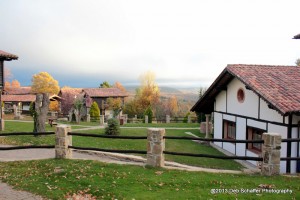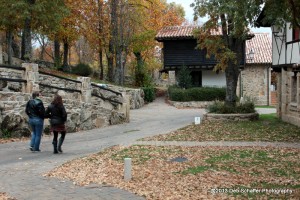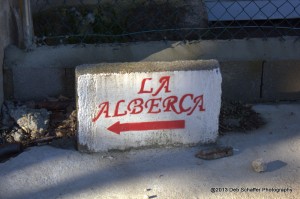
What’s it really like to participate in one of those English-language immersion programs in Spain?
I’m nervous and chilled standing outside a non-descript office building in Madrid. It’s first thing in the late November morning, and folks are gathering with their luggage and looking around wondering what we do next. A friend and I have volunteered to be native English-speakers in an English-language immersion program in Spain, and the group of about 40 folks is gathering on this sidewalk during the Madrid commute. Soon, we board the bus and leave the big city behind for the quiet of Northwestern Spain, about an hour south of Salamanca.
As the bus smoothly moves into traffic, the directors give us the first of several sets of instructions. The most important instruction: no Spanish allowed. Although the bus is quiet now, a few moments ago the low murmur of twenty or so conversations had filled the space. Each English speaker, or Anglo, was sitting next to a Spaniard having a conversation in English. This is what we’ve volunteered to do, and being nervous or uncomfortable is not an excuse to avoid talking.
There are several of these volunteer programs available in Spain. Native English speakers apply to volunteer for a week at one of several different resorts around Spain. Once accepted, volunteers are required to speak English for the entire week, following the instructions and the daily program outlined by the directors. This sounded very appealing while back in my office in Colorado and now it just sounds daunting.
We arrive at the resort
After a stop near the walled city of Ávila, we arrive at Abadio de los Templarios. The group from the week before is finishing up their farewells. They seem to be so sad to leaving one another. Will our group be like that at the end of our time together? The directors gather us for room assignments and we are put two to a villa, the Anglos downstairs and the Spaniards upstairs. The villas are very nice, though not luxurious with common living quarters and separate bedroom suites. We don’t spend much time there anyway as we drop our luggage and head back to the dining room for lunch. Luckily, we already know at least one person in the group. Unluckily, for the timid among us we’re asked to sit four to a table, with someone we haven’t yet met. It’s time to get social.
Lunch is three courses with wine and by the time lunch is over folks are much more relaxed. More rules of the road are announced, including requests to be on time for meals and to have patience as everyone gets used to the program. The directors ask the Anglos to work with the Spaniards on common language errors, and to be gentle. The Spaniards look much more anxious than any of the Anglos, and they are working very hard to maintain their side of the English conversation. I can see frustration on a few faces.
The schedule
The each day starts at 9:00 in the morning with breakfast and goes nearly non-stop until about 11:00 p.m. There are a few hours break from the activity mid-day. I find myself looking forward to the late afternoon siesta for a quick nap and some downtime. It also turns out to be a good time to get to know the other Anglos in the group. Since the Anglos are always paired with Spaniards, we only spend time getting to know the other English speakers during mealtimes.
It can be as difficult for the Anglos to listen to Spanish-accented English as is it for the Spaniards to discern our English inflection. The program brings together Anglos from around the world, and in our group we’ve got folks from Britain, Wales, Australia, Canada, the U.S., and Malta. In Spain, English is taught with a British twist, so our Canadian and U.S. accents are puzzling for some of the Spaniards. As a group of English speakers, we try to speak carefully to help our new Spanish friends understand.

As the week progresses, we take a few field trips from the beautiful resort. The town of La Alberca is a short walk away, and we spend an afternoon there learning about small-town Spanish life and the famous “jamon” (ham) of the area. We’re all getting much more comfortable with each other, and the nerves are receding. Sitting in the town square having coffee in the warm November sunshine, the group watches the community pig snuffle around the table for a handout, and then the owner of the café shoos the pig away. After the stress of the first couple of days, it’s fun to unwind in town.
Our own brand of crazy
After the first few “one-on-one” conversations, we’re all starting to enjoy the process. No one could have convinced me before I got here that one could speak to an emerging English speaker for an hour and not have many awkward silences. We talk about our families, our work and jobs, and the Spanish economy. Conversations flow about online classes, gathering mushrooms, what it’s like to live in the U.S, and the best shopping in Madrid. The Anglos huddle to come up with an explanation of the idiom “to be cheeky.” Members of the group do funny skits, play games, and tell stories into the night. The Spaniards are required to prepare and present two different talks during the week, and the Anglos spend time with each presenter perfecting their English to sound as natural as possible.
By the end of the week, we’re like a crazy family. The Spanish women have taught several Anglos the Sevillanas, a local folk dance. Our resident guitar player has entertained us during breaks and parties with traditional Spanish ballads. Our new friends arranged for a trip to the top of a nearby mountain to visit a centuries-old monastery during a siesta, rounding up enough cars and drivers. And a small group played hooky just long enough to buy some jamon from the best butcher in the area. We gathered between activities at the fireplace to warm up when it was cold and rainy. We truly bonded.
The week was a grand success. Those of us who were anxious forgot our fears. As we laughed with our friends through the final skit of the program, we were sad that it had to end. Spaniards started to realize that they really did understand the Anglos much better by the end of the week. One of the Spaniards mentioned that as he packed to leave, he realized that he had actually heard and understood the English-language songs coming over the radio. Invitations to visit families flew around.
Wrap-up
The next morning, we all gathered to say our goodbyes to those driving home and climbed on the bus for the trip back to Madrid. Back on the sidewalk in Madrid we all said good-bye one more time and headed off to our next adventure. Between the photo-sharing sites, social networking, and email we’ll keep in touch and remember our week of “no Spanish allowed.”
Want to volunteer as an English speaker in Spain? Contact Diverbo or Vaughn Town to apply for their programs. Your resort stay is free and transportation is provided to and from Madrid.